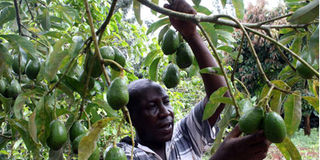Fresh produce exporters lose customs levy fight

Avocado exporters are some of the traders that went to court over the new 0.25 percent levy.
Fresh produce exporters have failed in their bid in court to quash government’s decision to introduce a 0.25 per cent levy on customs value of the export consignment.
The exporters wanted court to quash the regulations known as Crops (Horticultural Crops) Regulations, 2020 which increased the levy from the previous 30 cents per kilogram to 0.25 percent of the value of the consignment being exported.
They had sued the auspices of four organisations including the Fresh Produce Exporters Association of Kenya (FPEAK), Fresh Produce Consortium of Kenya, Avocado society of Kenya and Avocado Exporters Association of Kenya.
But Justice Anthony Mrima said the regulations were properly enacted since there was adequate public participation and there was no evidence that they were oppressive.
The Petitioners had contended that they were being subjected to over 40 licenses and permits so as to be able to undertake their businesses and that the additional levies were oppressive.
Describing the regulations as oppressive and unconstitutional, the exporters said it was unfair for government to introduce a levy that increased the tax of 30 cents per kilo by four times.
They wanted government’s decision reversed and the enforcement of the new levy stopped on grounds that the new regulations are aimed at financially frustrating them as they recommend draconian consequences for non-compliance.
They also contended that the regulations were gazetted by the Cabinet Secretary for Agriculture in absence of stakeholder and public participation.
But Justice Mrima said that evidence indicated there was reasonable and meaningful public participation and engagement during formulation of the regulations.
The Parliament, as well, approved of the aspect of the adequacy of the public engagement.
“The Petitioners and the Kenya Flowers Council were accorded ample opportunity and they presented their case. The problem seems to have been that their proposals were not adopted as the final position on the matters,” said the judge.
On whether the regulations contravene Constitution for not sharing the tax burden fairly, the judge said there was clarity on the levies as provided in the Third Schedule to the Regulations.
“The crops destined for export and their customs value as well as those for import and their values are provided for in the Third Schedule to the Regulations. There is clarity on the levies. Any administrative issues arising from the computation of the levies cannot amount to constitutional issues. Such issues can be sorted out by the concerned parties,” said the judge.
As to whether the levies under were unfair and oppressive, the court said there was no adequate evidence to support the claim.
Not even the types of the levies and names of the licenses within the horticulture industry were disclose, said the judge.
“Proof of the said allegations called for consideration of various facets of the public finance vis-à-vis the levies in the horticultural industry at large. The alleged oppressive manner occasioned by the impugned levies had to be empirically demonstrated at least by an expert as against the other sectors,” said the judge.




